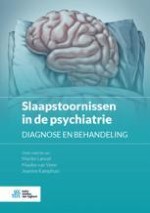2021 | OriginalPaper | Hoofdstuk
2. Belang van slaap voor cognitief en psychologisch functioneren
Auteurs : Dr. Peter Meerlo, Dr. Robbert Havekes
Gepubliceerd in: Slaapstoornissen in de psychiatrie
Uitgeverij: Bohn Stafleu van Loghum
2021 | OriginalPaper | Hoofdstuk
Auteurs : Dr. Peter Meerlo, Dr. Robbert Havekes
Gepubliceerd in: Slaapstoornissen in de psychiatrie
Uitgeverij: Bohn Stafleu van Loghum
Print ISBN: 978-90-368-2523-8
Elektronisch ISBN: 978-90-368-2524-5
Copyright: 2021
